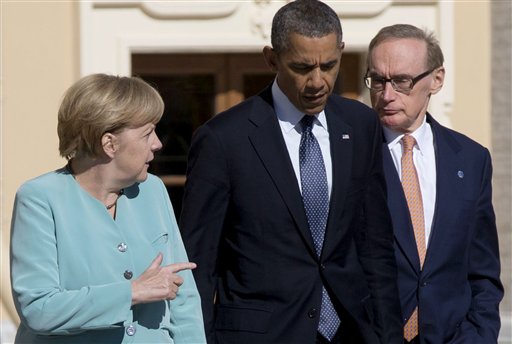After a summer of domestic surveillance revelations by the National Security Agency, Americans and Europeans alike are still learning just how far the programs go, with the latest stop being German Chancellor Angela Merkel’s cellphone – and through it, the Oval Office.
Videos by Rare
The latest spring in the NSA’s increasingly leaky, secret-laden ship brought a tidal wave of mixed messages, ambiguous admissions, and plausible deniability from the agency to the president, prompting the world to wonder when the president knew the NSA was eavesdropping on Merkel – and through her, himself.
According to the German newspaper Bild am Sonntag citing an NSA source, NSA Director Gen. Keith Alexander briefed President Obama on the Merkel’s cellphone surveillance in 2010. The paper goes on to say the president wanted more information on Merkel because, “he did not trust her.”
National Security Agency Spokesperson Vanee Vines released a statement the same day denying the allegation, stating, “News reports claiming otherwise are not true.”
“Gen. Alexander did not discuss with President Obama in 2010 an alleged foreign intelligence operation involving German Chancellor Merkel, nor has he ever discussed alleged operations involving Chancellor Merkel,” Vines’ statement read.
As some media outlets have pointed out, the statement’s mix of specificity and ambiguity does not clarify whether the president was briefed on the operation another way. A senior administration official told CNN the president was unaware of the Merkel surveillance until late summer, when he ordered it stopped.
According to CNN other officials claim the president did know, and at the very least, multiple White House staff members were aware. One said that Obama, like every president, received a briefing on the framework of all intelligence programs upon taking office in 2009 (Merkel surveillance began in 2002), while another argued such briefings often lack in-depth details.
A Fox News column by Judge Andrew P. Napolitano recounted U.N. Ambassador Susan Rice’s confrontation with her German counterpart over the matter, during which Rice said the White House would deny knowledge of the chancellor’s cellphone spying. Rice later called the official back to retract her statement, and said the White House knew about the operation, but the president denied knowledge of it.
“There are a number of efforts under way that are designed to increase transparency, to work with Congress to look at reforms to the Patriot Act, to look at ways that we can increase oversight and increase constraints on the authorities provided by these programs,” White House Press Secretary Jay Carney said following the release of the German piece and the NSA denial statement.
“There’s a review under way that will look at, among other issues, some of the very specific things with regards to intelligence-gathering, including matters that deal with heads of state and other governments,” Carney said.
Neither the press secretary nor the National Security Council would confirm or deny reported operations or news reports discussing the operation or the president’s knowledge of it.
“We are not going to comment publicly on every specific alleged intelligence activity, and as a matter of policy we have made clear that the United States gathers foreign intelligence of the type gathered by all nations,” NSC spokesperson Caitlin Hayden said.
During a House Intelligence Committee hearing earlier this week discussing changes to the Foreign Intelligence Surveillance Act, Director of National Intelligence James Clapper testifying alongside Gen. Alexander staunchly defended the agency’s activities – for the most part.
“We do not spy on anyone except for valid foreign intelligence purposes and we only work within the law. Now, to be sure, on occasion, we’ve made mistakes – some quite significant,” Clapper said.
The sentiment was echoed in the President Obama’s remarks on Fusion TV after the program leaked.
“We give them policy direction, but what we’ve seen over the last several years is their capacities continue to develop and expand, and that’s why I’m initiating now a review to make sure that what they’re able to do doesn’t necessarily mean what they should be doing,” the president said.
Related articles
- Was Obama briefed on Merkel surveillance? (rare.go-vip.net)
- NSA Denies Reports That Obama Was Briefed On Angela Merkel Surveillance In 2010 (huffingtonpost.com)
- NAPOLITANO: Spying on the president (rare.go-vip.net)



